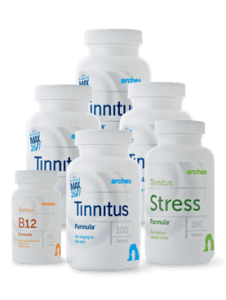By Barry Keate
Barry Keate, has lived with tinnitus over 40 years and has published 150+ research articles on numerous aspects of tinnitus. He is an expert on the condition and a well-known advocate for those with tinnitus.
 Stress is a natural response to many of life’s challenges and can result from both positive and negative experiences. Anything from a wedding, to a new job, or an illness can produce stress. In response to a stressful or threatening situation, chemical changes occur which, in turn, cause physical changes in our body. Blood vessels constrict, reducing circulation, and heart rate, breathing and blood pressure increase. When the situation is resolved the body returns to its normal functioning levels.
Stress is a natural response to many of life’s challenges and can result from both positive and negative experiences. Anything from a wedding, to a new job, or an illness can produce stress. In response to a stressful or threatening situation, chemical changes occur which, in turn, cause physical changes in our body. Blood vessels constrict, reducing circulation, and heart rate, breathing and blood pressure increase. When the situation is resolved the body returns to its normal functioning levels.
With tinnitus, the body often reacts as if it is being threatened. When the tinnitus is constant and prolonged, the physical responses such as anxiety, depression and insomnia can aggravate the tinnitus. Prolonged stress will make the tinnitus noises much louder than they would be in a relaxed state.
It is very important that people suffering from tinnitus learn to reduce stress levels as part of their recovery. The following suggestions are based on recommendations from the American Tinnitus Association. All of these suggestions may be used in combination with other treatment methods such as masking, Tinnitus Retraining Therapy, and/or the Arches Tinnitus Formulas.
Cognitive Therapy
Cognitive Behavioral Therapy is a kind of counseling that is based on treating a patient’s emotional reaction to tinnitus rather than the tinnitus itself. It is designed to change the perception of tinnitus and identify and reduce negative behaviors and thought patterns. Counseling programs are individually designed for patients in consultation with the therapist.
Biofeedback
 Biofeedback is a relaxation technique that teaches people to control certain automatic body functions such as pulse and brainwave activity. The goal is to help people effectively cope with stressful situations, not by reducing the stress but by reducing the body’s physical reaction to it.
Biofeedback is a relaxation technique that teaches people to control certain automatic body functions such as pulse and brainwave activity. The goal is to help people effectively cope with stressful situations, not by reducing the stress but by reducing the body’s physical reaction to it.
Biofeedback instruments have electrodes that attach to the forehead and neck and measure such things as skin temperature, muscle contractions and heart rate. These measurements are electronically converted into blinking lights or audible beeps so patients can see or hear their heart rate, temperature, etc. Patients are taught to relax while they are connected. When they are successful at relaxing they hear slower beeps or see less frequent blinking lights. Eventually, patients learn to control their physical tension without using the device.
Hypnotherapy
Hypnosis is a procedure in which a hypnotist suggests changes in thought, feelings, perceptions or behavior to the person being hypnotized. The goal is to create an external focus, such as thinking about a relaxing situation, to redirect the person’s attention away from the tinnitus. The hypnotic state is not like being asleep; in fact it is more like being hyper-alert. Brain waves are as active during hypnosis as they are during full wakefulness.
Tinnitus patients benefit greatly from the deep relaxation afforded by one-on-one hypnosis. They can also be easily trained to perform self-hypnosis which can accomplish the same goal.
You can read an excellent article on tinnitus and hypnotherapy by Charles Smithdeal, MD, C.Ht, in our Tinnitus Library.
Stress Reduction Ideas
Learning to Relax
Progressive relaxation is one way to naturally relax the body. By tensing and untensing muscles throughout the body, you can induce a thorough state of complete body relaxation. This will not make the tinnitus disappear but it will help greatly in making you feel calmer, sleep better and be equipped to handle the stress without worsening the tinnitus.
Here is one method of progressive relaxation:
Sit in a comfortable chair with eyes closed, arms on the armrest, palms down.
1 – Breathe deeply and slowly a few times.
2 – Tighten each of the following muscles for 5 seconds, then release for 30 seconds:
3 – Clench both fists, then release.
4 – Press your back against the chair, then release.
5 – Tighten your abdomen, then release.
6 – Tighten your jaw, then release.
Focus on other muscles, one at a time, then tighten and release each one. Many books have been written about relaxation. You Must Relax by Edmund Jacobson and The Relaxation Response by Herbert Benson are two excellent books.
Deep Breathing
Abdominal breathing is a natural relaxant. To do this, lead with your waist as you breathe in. Breathe in through your nose to the count of eight, slowly filling the diaphragm. Hold for the count of four then exhale slowly through the mouth to the count of eight. Repeat at least five times.
 Exercise
Exercise
Take a walk, swim, play tennis or golf. Whatever kind of exercise you enjoy will make you feel stronger and is a great way to work off stress and anxiety. If the exercise involves exposure to loud sound, remember to protect your ears with earplugs or ear muffs. Some individuals say that exertion makes their tinnitus louder, however only temporarily.
Regular, vigorous exercise is one of the best ways to stay in shape and stay healthy. Exercise is medicine. It promotes circulation, protects the heart, prevents Type II Diabetes, and acts to preserve the body in many ways. It is wonderful for stress reduction and helps in getting a good night’s sleep. To get the full benefit of exercise, the heart rate must be increased to at least 100 beats per minute, for at least 20-30 minutes, three times or more per week.
Move
T’ai Chi and yoga are two body movement disciplines that require you to slowly move, breathe and stretch at the same time. These activities can relax tight muscles and improve circulation. They are an excellent way to relax and firm up. Classes, videos, and books are available for all ages and physical abilities.
A clinical study at Harvard Medical School and Boston University School of medicine showed that a single 60-minute yoga session increased brain GABA levels by 27%.
GABA is the brain neurotransmitter responsible for slowing hyperactivity in the brain. It opposes the action of glutamate, the excitatory neurotransmitter, that is the underlying cause of tinnitus. GABA slows the brain and leads to a decrease in depression, anxiety and tinnitus.
Sleep
Many people with tinnitus have trouble sleeping. Sleep is absolutely essential to keep your body fit and relaxed. I advocate nearly anything that will help people get a good night’s sleep. Make sure your bed is comfortable, use a tabletop environmental sound machine and don’t ingest anything in the evening that will keep you awake. There are many relaxing teas on the market that will aid sleep. Melatonin and Kava Kava may be helpful. See our article Getting to Sleep with Tinnitus.
Take Arches Tinnitus, Stress & B-12 Formulas
Arches Tinnitus Formula®, Tinnitus Stress Formula® and the B-12 Formula® will all be helpful in reducing tinnitus and relaxing the body. They have been clinically proven to reduce tinnitus symptoms and can be used with any of the above techniques.
Arches Tinnitus Formula contains Ginkgo Max 26/7®, our proprietary Ginkgo biloba extract. It is a more highly purified and potent ginkgo than anything found in the marketplace. It is especially high in Bilobalide, the part of the extract that antagonizes glutamate and enhances GABA.
The B vitamins found in Arches Stress and B-12 Formulas are especially helpful for coping with stress. In the words of Michael Seidman, MD “Most B-complex vitamins cannot be stored in the body and must be replaced daily from food sources or supplements. B vitamins help maintain healthy skin, eyes, muscle tone and support the functions of the liver and central nervous system. They are also extremely important in helping to deal with depression, stress and anxiety”.
Get Free Shipping!
Order now and get free shipping on either the Tinnitus Starter Kit or Combo Pack. Try the doctor recommended products with clinically proven ingredients for tinnitus. No coupon code required.

